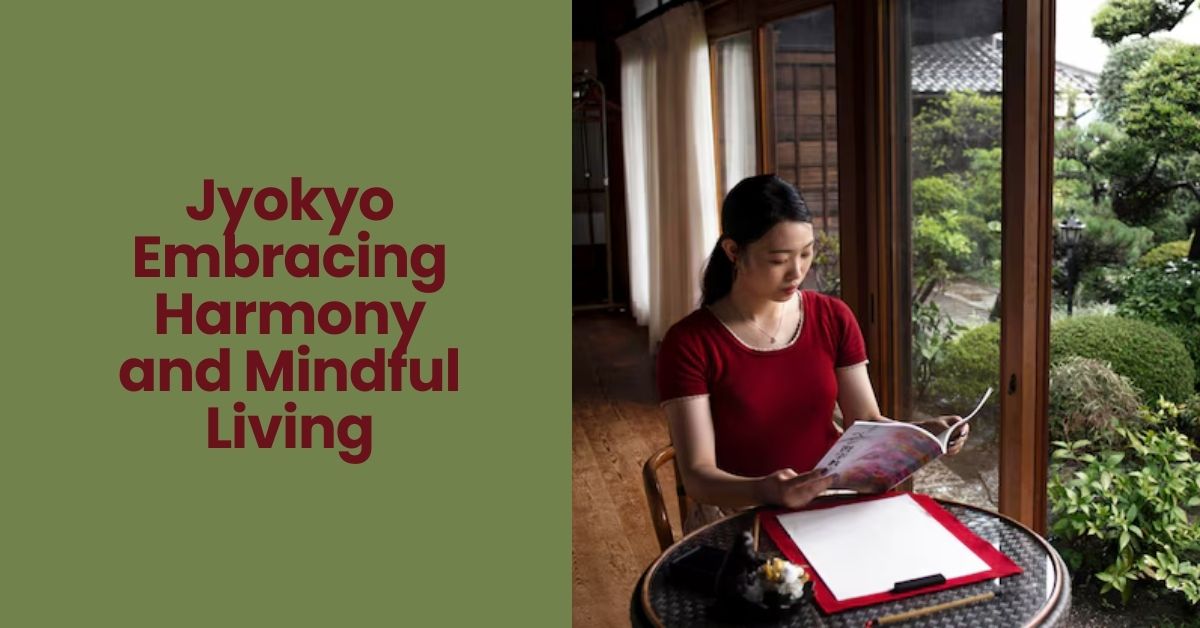Jyokyo: Embracing Harmony and Mindful Living

Introduction to Jyokyo
The sheer volume and velocity of contemporary life may be dizzying at times. We may want for something more profound, something that speaks to our very essence, when faced with the continual pressures and diversions of life. Here we have Jyokyo, a revolutionary Japanese idea that is starting to make a difference all across the world. Jyokyo encourages people to find calm and awareness in the midst of life’s ups and downs by drawing on its deep cultural roots.
As we delve into this fascinating idea, you’ll discover how embracing Jyokyo can lead to personal transformation and fulfillment.
Get ready to unlock new perspectives that could redefine your everyday existence!
TRENDING Soutaipasu Explained – Meaning, Uses, and Importance in Tech
What is Jyokyo?
An important principle in Japanese philosophy, jyokyo means “living in harmony.” It emphasizes harmony between oneself and the environment and goes beyond basic survival. This way of thinking advocates for people to become more in tune with their surroundings and more self-aware.
The essence of Jyokyo is a harmonious union of soul, body, and mind. It’s about cultivating connections with people and the natural world and discovering serenity in the midst of turmoil.
This idea combines timeless knowledge with the difficulties of today’s world. Practicing jyokyo is a great way to slow down, think, and be grateful for what you have.
Individuals can learn to elegantly traverse life’s complexity by cultivating awareness through this perspective. The essence of Jyokyo is to make room for peace in the midst of the chaos of everyday life, and its simplicity is part of its charm.
The Roots of Jyokyo in Japanese Culture
Jyokyo has its roots in ancient intellectual traditions and is hence intrinsic to Japanese culture. It personifies the core value of coexisting peacefully with the natural and social environments.
The idea is based on Shinto principles, which emphasize the importance of respecting the natural world and how it all fits together. This bond fosters reverence for every facet of existence.
In addition, Jyokyo has been greatly influenced by Buddhism. Mindfulness and self-awareness are emphasized as means to one’s own development in the teachings.
Jyokyo has kept its essential principles—balance, respect, and communal focus—as Japan has changed through the ages. Tea rituals and Zen gardens are lovely examples of art that embody these ideas.
By encouraging emotional and mental wellness in the face of fast urbanization, Jyokyo is still having an impact on contemporary Japanese lifestyles.
Understanding the Principles of Jyokyo
Essentially, Jyokyo is all about being in tune with yourself and the world around you. Everyone should strive for harmony in their lives, according to this idea.
Being aware is key to Jyokyo. Being fully present allows us to have a stronger bond with our thoughts and environment. It heightens consciousness, which in turn allows one to value the nuanced details of ordinary life.
Flexibility is another fundamental principle. To overcome life’s obstacles, one must be mentally and methodically adaptable. New possibilities and personal development can result from welcoming change.
Jyokyo also places a premium on community. Empathy and mutual respect are the building blocks of healthy relationships, which in turn improve people’s health and happiness.
If one is prepared to delve thoroughly into these ideas, they can give life-altering revelations. Anyone is welcome to go on a voyage of self-discovery and satisfaction upon entering Jyokyo.
How Jyokyo Can Benefit One’s Life
Everyday problems may be seen in a new light using Jyokyo. Many people report an improvement in their mental and behavioral clarity after adopting this concept.
It promotes awareness of the present moment and the practice of mindfulness. A decrease in stress levels and an improvement in emotional health may result from this. Learn to live in the now, and all those pesky distractions will melt away.
Jyokyo also encourages perseverance. The lesson is that obstacles are a natural part of life’s path. By adopting this perspective, confronting challenges becomes less intimidating and more doable.
Developing more meaningful relationships is yet another perk. Communicating with people while keeping Jyokyo in mind helps to cultivate compassion and understanding. When such ideals are maintained, relationships grow.
Adding Jyokyo to your daily routine might give you a creative boost. Without the constraints of fear of criticism or rejection, a freed mind is free to experiment with novel approaches.
Practical Ways to Incorporate Jyokyo into Daily Life
You may change your outlook by incorporating Jyokyo into your everyday life. Get started by practicing mindfulness. Every day, pause for a few seconds and just breathe.
Take part in purposeful discussions. Pay close attention so that other people can finish speaking without interrupting. Respect and connection are fostered in this way.
A thankfulness notebook can be created. Remind yourself of the good things in your life and the importance of being present by writing down three things you’re grateful for every day.
Establish limits for yourself that are in line with the Jyokyo ideals. Respect the needs of others while prioritizing your own self-care.
You may put your compassion and empathy skills to use by volunteering at a local event or doing community service.
Embrace a minimalist aesthetic in your home. Regular decluttering helps establish an atmosphere that encourages serenity and mental clarity.
Criticisms and Controversies Surrounding Jyokyo
Jyokyo has many detractors, even if it is becoming more popular. Proponents of a more nuanced understanding of the notion contend that it is susceptible to oversimplification and misunderstanding. The commercialization of philosophy is a possible outcome of this watering down.
Skeptics also worry that Jyokyo can lead people to put too much emphasis on themselves and not enough on real human connection. Many practitioners find it necessary and tough to balance personal growth with empathy and community participation.
Additionally, issues of cultural appropriation have been raised. While many in the West are warming up to this Japanese idea, others worry that it loses some of the depth and character that would make it really authentic.
The cultural issues around mindfulness techniques and their role in our increasingly fast-paced lives are reflected in these debates. By approaching Jyokyo with a critical eye, we may learn about its history and its place in Japanese culture while also having fruitful discussions.
Conclusion
A life-altering adventure awaits those who embrace Jyokyo. You are encouraged to reconsider your strategy when confronted with both possibilities and obstacles by this idea.
Building resilience and mindfulness are two outcomes of incorporating its concepts into daily living. Every every moment presents a chance for personal development and self-reflection.
Jyokyo is lovely since it is easy to get there. You are already equipped with all the knowledge and abilities you need; all you need is to seize the power that is waiting for you.
When more and more people start living by this principle, it may have a positive effect on entire communities. Goodwill, understanding, and teamwork are boosted by the domino effect.
Think about how Jyokyo might motivate you to make modest adjustments that can lead to big improvements in your outlook. Sharing experiences helps people overcome their own limitations and those of society, which is why it’s so important to foster an environment where everyone can flourish.
Stay informed with the latest trends — explore TenseMagazine today.
FAQS
What does Jyokyo mean?
The term “jyokyo” describes an ideal way of life that prioritizes maintaining balance and harmony with one’s surroundings. The key is to be genuine while also showing consideration for other people.
How is Jyokyo practiced in daily life?
Mindfulness techniques, encouraging empathy, and participating in communal activities that enhance collective well-being are all things that may be incorporated into regular routines.
Can anyone practice Jyokyo?
Absolutely! Regardless of one’s background, everyone can adopt Jyokyo beliefs. Connection with people and personal improvement are the main points.
Is there any scientific backing behind Jyokyo’s benefits?
Although there may be a lack of study on Jyokyo specifically, notions similar to it, such as mindfulness, have been extensively studied for their beneficial impacts on psychological health and general wellness.
Are there any criticisms associated with Jyokyo?
It may be difficult to fully incorporate into contemporary living, or it may be too utopian, according to some detractors. Some think it could simplify too much complicated societal relations.






